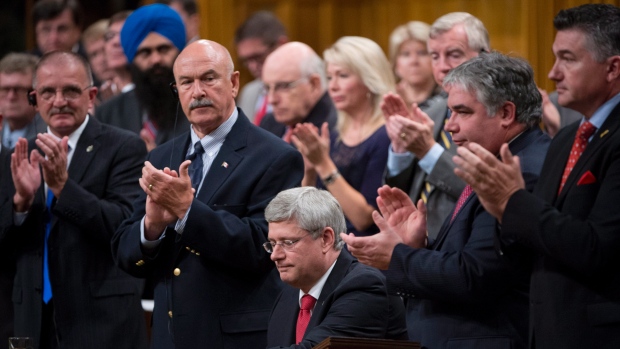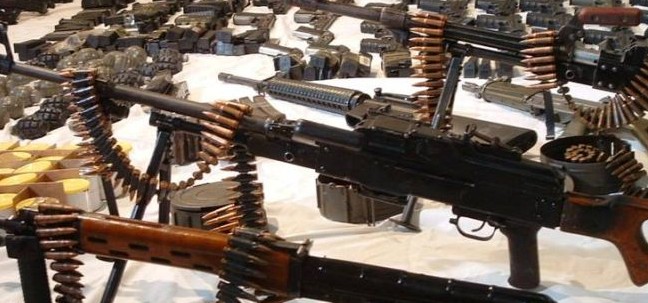Alessandro Gagliardi analyses the position of the three main parties on Canada’s deployment of air assistance to Iraq in a somewhat tongue-in-cheek fashion.
HARPER
With the Conservatives at the reins of Canada’s foreign policy and with strict command over where and how Canada’s financial and material resources are invested to achieve foreign policy objectives, we’ll let Stephen Harper’s official statement be the benchmark against which we will evaluate and compare Mulcair’s and Trudeau’s remarks to see if they make any sense.
Harper lays out the Canadian mission in unambiguous terms.
- to degrade IS’ military movements and ability to operate bases, (Canada will bomb IS where and when IS presents itself to Canada as a target). Harper acknowledges that while IS will not be eliminated, bombings will significantly reduce the risks that IS poses in Iraq.
- Canada will only continue to operate with the endorsement of the Iraqi government.
- Canada is taking measured steps to avoid a long-term mission.
- Importantly, Canada’s mission does not preclude a humanitarian element.
- Canada’s mission encompasses financial assistance.
- In sum, we’re going to bomb IS in Iraq only as long as we have the permission of the Iraqi government and we’re only going to do so for six months. We HAVEN’T RULED OUT HUMANITARIAN ASSISTANCE, and we’re going to contribute financially to the local government as well.
MULCAIR
Mulcair insists that Canada’s first contribution should be to use every diplomatic, humanitarian and financial resource at our disposal to respond to the overwhelming human tragedy unfolding on the ground and strengthen political institutions in both Iraq and Syria. He warns that “Canada, for our part, should not rush into this war.”
Unfortunately, Mulcair himself has rushed to make statements that are slightly misinformed.
He claims that the government is choosing to pursue a purely combat-oriented mission, which is not the case. After all, Canada has been making financial contributions to the Iraqi government and to other Arab League governments for the past month, ever since Canadian military advisors were sent to Iraq. Military action is not Harper’s only choice by any stretch of the imagination, nor his first choice. It’s a supplemental choice.
Mulcair points to the lack of a stable and well-functioning government in Iraq and subsequently suggests that a solution entails the deployment of diplomatic, humanitarian and financial resources to effect state-building in Iraq. This is a very fair point. Canada should engage with the Iraqi government to bolster governmental integrity; however, this is far easier said than done. The Iraqi government is not one that can be cleansed of corruption and malfeasance and made to function efficiently in six months such that it can direct its military, which is rife with corruption itself, to face IS independently without international military assistance.
Mulcair’s proposal that Canada should advise the Iraqi government is excellent. This is a sound strategy, albeit one that should be undertaken along with a multinational combat mission. Canada can’t perform state-building apart from a military mission considering that the Iraqi government is literally under siege by IS fighters. Diplomatic, humanitarian and financial contributions will have limited effect when IS is shooting at government buildings and public officials daily. How can we provide effective state-building capacity as Mulcair suggests if IS is blocking roads to cities, entrances of government buildings, and routinely attacking Iraqi government personnel?
Furthermore, Mulcair is silly to draw parallels between the current conflict and Canada’s refusal to join the 2003 Iraq war. According to Mulcair, Canada’s refusal to join the US-led invasion of Iraq in 2003 should inform our decision to do so now. The justifications to participate in the 2003 Iraq war were dubious, but in this conflict, the threat is painfully evident and much of the international community stands behind a military mission.
In sum, Mulcair’s proposal to effect state-building is a great one, but lacks a sober analysis of the limitations imposed by conditions on the ground. How can Canada and the international community effect state-building when IS occupies a third of the country and is killing people left, right and centre?
TRUDEAU
The Liberal leader’s remarks don’t offer much in the way of a foreign policy proposal, except that he disagrees with what the current government plans to do.
Trudeau believes that there is indeed a role for Canada in Iraq and that there is a distinction between non-combat and combat. He believes that Canada could lend support in a non-combat capacity since all our other allies are already contributing combat resources.
Where Trudeau makes grave errors is in his contention that the government has not provided members of the Canadian military with clarity, a plan and the truth. Actually, Harper has done just that. He has stated explicitly that the Canadian military will deploy to attack IS and it will do so in Iraq for six months and only as long as Canada has the permission of the Iraqi government to do so. The Canadian Air Force will conduct airstrikes and Canadian advisors will continue to advise the Iraqi military and government. The Harper government’s plan is quite clear, actually.
In sum, Trudeau is right to suggest that it’s possible for Canada to contribute to the international mission in a non-combat capacity, especially since our NATO allies are already bombing IS. What’s vexing though is his justification for a non-combat role. His belief, which perhaps accords with the belief of many Canadians, is that combat is “uncanadian” and that perhaps it besmirches our heritage of Pearsonian diplomacy and peacekeeping. This is more of a romanticization of Canada’s foreign policy rather than what Canadian foreign policy looks like in reality, historically speaking. Let’s not forget that Canada contributed militarily in the 1991 Gulf War, the 1999 bombing of Yugoslav forces in Kosovo, the 2001 War in Afghanistan, the 2011 bombing of Libyan forces, and in many other operations. Canadian military deployment is nothing extraordinary or “uncanadian” for that matter. It’s actually quite routine.
Trudeau places a premium on humanitarian assistance, but Harper has clearly said that his government’s plan DOES NOT PRECLUDE A HUMANITARIAN ELEMENT. Canadians should have no illusions though. It’s difficult to contribute in a meaningful humanitarian capacity when bombs and bullets are flying. A few airdrops of food and water will do little to upend the horrors committed by IS daily. There’s simply no peace yet to allow for an effective humanitarian mission although certainly when that peace emerges Canada will contribute in that capacity. Effective humanitarian missions that engage directly with internally displaced persons and victims of conflict can only exist in the context of a negotiated cease-fire or peace agreement where the safety of unarmed humanitarian workers can be guaranteed. Sending unarmed peacekeepers and humanitarian aid workers into an extremely hostile environment like Iraq without a ceasefire is essentially to condemn peacekeepers to death.
Past cases like Rwanda are evidence of this where UN peacekeepers were placed between unpacified warring factions and butchered alive, as are the recent IS beheadings of innocent civilians. IS will never agree to a ceasefire; they are well armed, well funded, ferocious and incredibly driven.
Trudeau makes a few legitimate suggestions, but falters like Mulcair by failing to consider conditions unfolding on the ground.




